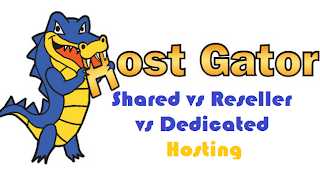
With over 8 million domain names served, HostGator is one of the most popular web hosting companies today. The Houston-based company has met with remarkable success, and has been able to keep its customers loyal with its superb service, cheap rates and secure experience along with a handful of useful features and tools that make hosting a website a piece of cake. HostGator provides three major hosting plans; Shared, Dedicated and Reseller - all of whom serve different purposes. If you can't seem to decide between them, then this post will help you choose the best hosting plan that best suits your needs.
Shared Hosting Plan:
The Shared hosting plan is technically designed for a single owner as it provides a single control panel for as many domains as you care to add. Also, because of its low price, it is the plan recommended for new websites. Some of the pros and cons of this feature are as follows.
Pros:
- UNLIMITED sub-domains, FTP and Email accounts.
- UNLIMITED disk space and bandwidth.
- Cheap rates.
Cons:
- Low CPU power.
- Not efficient for multimedia streaming.
- Only a single control panel - low privacy for multiple users
Reseller Hosting Plan:
Reseller accounts are for users who want to sell hosting. A separate control panel is provided for each domain which makes selling simple. Same is not the case with a shared account because there is only one main control panels for all the domains. Some of the good and bad features are as follows:
Pros:
- Allows users to sell hosting.
- UNLIMITED sub-domains, FTP and Email accounts.
- Each domain has a separate control panel.
Cons:
- Limited bandwidth and disk space.
- Low CPU power.
- High prices.
Dedicated Hosting Plan:
HostGator also offers you to easily get your own server machines that you can use with your website. So, the need of this secondary channel in between is no more necessary. Dedicated hosting is also what most professionals recommend as the best of them all. Let’s take a look at its pros and cons.
Pros:
- Control over the certificates with the Web Host Manager.
- Great bandwidth and disk space.
- More secure, reliable and trustable.
Cons:
- Difficult to manage and maintain.
- Capacity increments – a hard step.
- More space requirements.
The Best?
You Decide! All of them have their good points and bad points. Their selection, depends upon your requirements. By carefully knowing what each has to offer, this selection, which surely is a really important step for your business, can be made in no time. Let us know what appeals to you the most. Cheers :)

If you don't want to get yourself into Serious Technical Trouble while editing your Blog Template then just sit back and relax and let us do the Job for you at a fairly reasonable cost. Submit your order details by Clicking Here »

This comment has been removed by a blog administrator.
ReplyDeleteThanks for talking this matter. The above blog provides the basic information of different types of hosting plans .
ReplyDeletegreat post
ReplyDeleteBlogolect - Learn Blogging